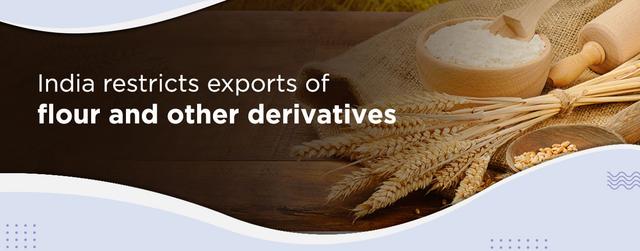
Cogoport Enables Movement of 11 Envirotainer Containers from India to Italy
Cogoport’s collective logistics and technical expertise came in handy as our operations and technical teams went the extra mile and designed...
After the ban on wheat in May, India now restricts flour exports and other derivatives. The central government (Centre) has now put restrictions on wheat exports and other related products like maida, semolina (rava), whole meal atta and resultant atta.

According to a notification from the Directorate General of Foreign Trade (DGFT), the decision will come into effect on, 12 July 2022.
Global supply disruptions in wheat flour and wheat grain have led to price fluctuations and potentially some quality-related issues with the wheat grain. While there is no complete ban on the wheat export policy, exporters must seek permission from an Inter-Ministerial Committee on all wheat exports.
The DGFT notification, issued on 6th July 2022, mandates that all exporters seek prior permission from the inter-ministerial committee on any wheat export before the outbound shipment.
In May 2022, the Centre amended the export policy for wheat by putting its export under the “prohibited” category.
According to reports, India exported almost 96,000 tons of wheat flour in April 2022, up from 26,000 tons in the same period last year.
Before 12th July, specific consignments of wheat flour can be exported, including possible situations wherein the loading of wheat flour on the ship commenced before this notification, and where the wheat flour consignment has been handed over to the Customs and is registered within their system (Between July 6th and July 12th, shipments where loading on the ship had started before July 6th).
On 4th May, the Centre announced a cut in wheat allocation under the Pradhan Mantri Garib Kalyan Anna Yojana (PMGKAY) until September 2022. This cut is estimated to save approximately 55 lakh tons of wheat.
There has been a gradual decline in per capita cereal consumption in India in the previous months. As for wheat, against the national average monthly per capita consumption of 4.288 kg (rural) and 4.011 kg (urban), consumption was higher in Uttar Pradesh, Madhya Pradesh, Bihar, New Delhi and Maharashtra, and lower in Odisha, West Bengal and Tamil Nadu.
The main reason for the reduction in cereal consumption results from lower procurement than last year. During the rabi marketing season (RMS 2022-23), 187.89 lakh tons of wheat has been procured till July 4th, which is 56.65% lower than the 433.44 lakh tons of wheat procured in the entire RMS 2021-22. This has been the trend across Punjab, Haryana, Madhya Pradesh and Uttar Pradesh, the states that contribute the most to the country’s food basket.
The Indian government stated that this move was made to manage the country's overall food security and meet the needs of the neighboring or other vulnerable nations.